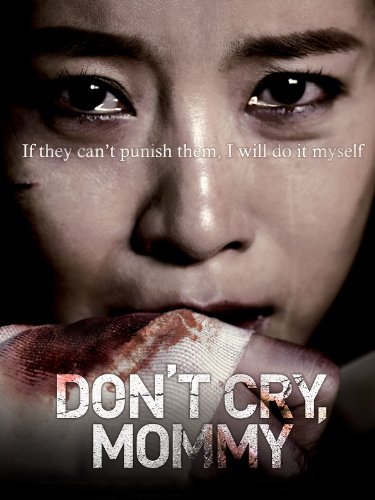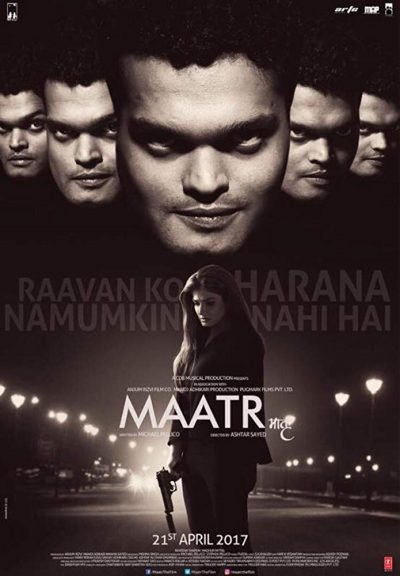★★★½
“Dear diary: my teen angst bullshit has a body count.”
 Becky (Wilson) is the quintessential troubled teenager. Since her mother died, she has become increasingly estranged from her father, Jeff (McHale, replacing the original choice, Simon Pegg, who had to drop out due to scheduling conflicts), not least because of his new girlfriend, Kayla. Dad arranges a weekend away for everyone at the family cabin to try and repair things. However, relationship problems rapidly become the least of everyone’s concerns. For a quartet of escaped Aryan Brotherhood convicts, led by Dominick (James, going completely and effectively against type), have turned up, seeking a key they had hid on the property. Not too happy to find an inter-racial family, they capture everyone except Becky, who had stormed off in one of her huffs.
Becky (Wilson) is the quintessential troubled teenager. Since her mother died, she has become increasingly estranged from her father, Jeff (McHale, replacing the original choice, Simon Pegg, who had to drop out due to scheduling conflicts), not least because of his new girlfriend, Kayla. Dad arranges a weekend away for everyone at the family cabin to try and repair things. However, relationship problems rapidly become the least of everyone’s concerns. For a quartet of escaped Aryan Brotherhood convicts, led by Dominick (James, going completely and effectively against type), have turned up, seeking a key they had hid on the property. Not too happy to find an inter-racial family, they capture everyone except Becky, who had stormed off in one of her huffs.
But hell hath no fury like a pissed-off teenage girl. Especially once Dominick starts torturing her father, the one person about whom Becky truly cares. Naturally, you do need to be able to accept that a 13-year-old – even one as unquestionably highly-motivated and vindictive as Becky – can take out hardened criminals, especially largely without the equalizer of a firearm. Yet the script does a fairly good job of overcoming this, setting up scenarios that allow her to use the tools at hand to her advantage. It helps some of her adversaries aren’t exactly the sharpest tools in the box, stupidity being a significant factor in their deaths by impalement and outboard motor.
The script also does a good job with villains Dominick and the 7-foot tall Apex (former WWE wrestler Maillet), who are respectively smarter and given greater depth than the bad guys usually receive in this kind of film. The latter, in particular, gets more of a character arc than anyone else bar Becky, becoming a surprisingly sympathetic character for a neo-Nazi. This development definitely helps the movie, when Becky is not extracting her furious, bloody vengeance [For instance, we could have done without the flashbacks to Becky playing the ukulele for her terminally ill mother. No, really]. Though it’s Dominick who provides the film’s most insanely hardcore moment, involving a scissors and an eyeball.
However, there is a fatal mis-step by having the movie’s climax take place after dark. This leaves the audience peering into the gloom, trying to figure out what’s going on. I’m still not sure what was being pulled behind the ATV on which Becky rides into her final battle. Going by its effect, I’m guessing at some kind of industrial strength earth-tilling equipment… This shadowy coyness is at odds with the in-your-face energy the film had shown up to that point, and which had it contending for a spot in Top 10, of any genre, for 2020. In the end, it probably falls just short, yet is still an enjoyable slice of brutal, hormonal savagery. As the end credits rolled, my mind drifted off to visions of a Hanna vs. Becky crossover story. Hey, we can all dream, can’t we?
Dir: Jonathan Milott, Cary Murnion
Star: Lulu Wilson, Kevin James, Joel McHale, Robert Maillet





 I say that, since this Korean film appears to have been at least a partial inspiration for not one, but two Bollywood films which were recently reviewed here:
I say that, since this Korean film appears to have been at least a partial inspiration for not one, but two Bollywood films which were recently reviewed here:  A somewhat cheesy melodrama, this throws together elements from Western pot-boilers Double Jeopardy and If Tomorrow Comes, adds a handful of Bollywood spice, and to be honest, probably overcooks the whole thing a bit. The title translates as “There Was a Beautiful Woman”, presumably referring to the heroine of the piece, travel agent Sarika (Matondkar). Into her office one day comes hunky businessman Karan Singh Rathod (Khan), and after some reluctance, she begins a relationship with him. However, it turns out he is actually a mobster, and manipulates her into taking a fall rather than incriminating him, which nets Sarika a seven-year prison sentence. Escaping from jail, she vows to destroy her former lover, and in turn, works on framing Karan with his criminal pals, by making it look like he murdered a colleague and stole money.
A somewhat cheesy melodrama, this throws together elements from Western pot-boilers Double Jeopardy and If Tomorrow Comes, adds a handful of Bollywood spice, and to be honest, probably overcooks the whole thing a bit. The title translates as “There Was a Beautiful Woman”, presumably referring to the heroine of the piece, travel agent Sarika (Matondkar). Into her office one day comes hunky businessman Karan Singh Rathod (Khan), and after some reluctance, she begins a relationship with him. However, it turns out he is actually a mobster, and manipulates her into taking a fall rather than incriminating him, which nets Sarika a seven-year prison sentence. Escaping from jail, she vows to destroy her former lover, and in turn, works on framing Karan with his criminal pals, by making it look like he murdered a colleague and stole money. I decided I might as well combine these two into a single review. Having watched them back-to-back, even though made and set three years apart, they felt very much like the continuation of a single story about the same characters. The main one is Roxy (Mele), who is a dancer at a Wisconsin strip-club run by the sleazy Stag (Therrien), mostly as a money-laundering front for local organized crime. When he and his pal rape an employee, Alana (Pearce), Roxy along with the victim and another dancer, Crystal (Fierman), decide to take revenge by robbing Stag. That means getting into the safe in his office where the money is, and he’s not exactly going to give up the combination freely. Still, nothing that a piano-wire garrotte round the testicles can’t solve, surely? Except, as usual in this genre, the heist doesn’t go smoothly. Stag’s office quickly begins to resemble a mortuary, as unwelcome guests need to be handled.
I decided I might as well combine these two into a single review. Having watched them back-to-back, even though made and set three years apart, they felt very much like the continuation of a single story about the same characters. The main one is Roxy (Mele), who is a dancer at a Wisconsin strip-club run by the sleazy Stag (Therrien), mostly as a money-laundering front for local organized crime. When he and his pal rape an employee, Alana (Pearce), Roxy along with the victim and another dancer, Crystal (Fierman), decide to take revenge by robbing Stag. That means getting into the safe in his office where the money is, and he’s not exactly going to give up the combination freely. Still, nothing that a piano-wire garrotte round the testicles can’t solve, surely? Except, as usual in this genre, the heist doesn’t go smoothly. Stag’s office quickly begins to resemble a mortuary, as unwelcome guests need to be handled. I didn’t think the sequel worked as well. While Roxy returns, she has been recast, being now played by Matheis – I’m not sure what happened to Mele. Still, I did laugh when one supporting character greets her with, “You look different!” Oddly, while the first film started with Roxy skipping town, the second sees her back, working at the same venue where she was involved in a multiple homicide. I know strippers are renowned for making poor decisions, but still… It turns out, having absconded with nine hundred grand of the mob’s money isn’t a good idea. They want it back, and to this end, have sent a trio of hired killers, named the Three Bears by Roxy. They’re prepared to do anything, up to and including both kidnapping and murder. But Roxy, along with Jesse (Radzion), a friend of Alana’s, and another dancer, Alura (Laventure), plots to turn the tables on the Three Bears, by robbing their boss.
I didn’t think the sequel worked as well. While Roxy returns, she has been recast, being now played by Matheis – I’m not sure what happened to Mele. Still, I did laugh when one supporting character greets her with, “You look different!” Oddly, while the first film started with Roxy skipping town, the second sees her back, working at the same venue where she was involved in a multiple homicide. I know strippers are renowned for making poor decisions, but still… It turns out, having absconded with nine hundred grand of the mob’s money isn’t a good idea. They want it back, and to this end, have sent a trio of hired killers, named the Three Bears by Roxy. They’re prepared to do anything, up to and including both kidnapping and murder. But Roxy, along with Jesse (Radzion), a friend of Alana’s, and another dancer, Alura (Laventure), plots to turn the tables on the Three Bears, by robbing their boss. The action-heroine genre has seen its share of high-profile flops in the past. But this long-delayed entry, originally due out in February 2019, is among the worst, setting a record for the lowest ever opening at the North American box-office for a wide release. It took in only $2.8 million from 3,049 theaters when it opened in January, and ended with a worldwide gross below $6 million, against a budget of $50 million. While smaller in scale, that’s a
The action-heroine genre has seen its share of high-profile flops in the past. But this long-delayed entry, originally due out in February 2019, is among the worst, setting a record for the lowest ever opening at the North American box-office for a wide release. It took in only $2.8 million from 3,049 theaters when it opened in January, and ended with a worldwide gross below $6 million, against a budget of $50 million. While smaller in scale, that’s a  History is largely filled with people being unpleasant to each other, usually for belonging to a different race, religion, nationality or even species [if you want to go back to the Cro-Magnons pushing out the Neanderthals about 40,000 years ago]. It’s sad and unfortunate, but it’s not something for which I feel personal responsibility – not least because it tends to work in both directions. My ancestors may have been part of the British Empire who, for example, invented the concentration camp in the Boer War. But my ancestors were also subject to the ethnic cleansing of the Highland Clearances, forced out to make way for sheep. Attempts to make me feel guilty for the sins of my forefathers are thus largely doomed to fail.
History is largely filled with people being unpleasant to each other, usually for belonging to a different race, religion, nationality or even species [if you want to go back to the Cro-Magnons pushing out the Neanderthals about 40,000 years ago]. It’s sad and unfortunate, but it’s not something for which I feel personal responsibility – not least because it tends to work in both directions. My ancestors may have been part of the British Empire who, for example, invented the concentration camp in the Boer War. But my ancestors were also subject to the ethnic cleansing of the Highland Clearances, forced out to make way for sheep. Attempts to make me feel guilty for the sins of my forefathers are thus largely doomed to fail. Almost four years after
Almost four years after  Make no mistake,
Make no mistake,  Many of the changes are relatively small – tweaks, rather than significant changes. For instance, rather than the landlady having a dog, Liang herself has a cat. Though in a morbid twist, she feeds her kitty some of the remnants of her victim. The gang attack is preceded by a battle between two different groups, both of whom have tracked Liang to a deserted Hong Kong park: the winners get… Well, gunned down by her. There is,
Many of the changes are relatively small – tweaks, rather than significant changes. For instance, rather than the landlady having a dog, Liang herself has a cat. Though in a morbid twist, she feeds her kitty some of the remnants of her victim. The gang attack is preceded by a battle between two different groups, both of whom have tracked Liang to a deserted Hong Kong park: the winners get… Well, gunned down by her. There is,  Revenge, as the saying goes, is a dish best served cold. Or, from another saying, hell hath no fury like a woman scorned. Illustrating both are the story told here. Jasmine Albertson had already gone through the lows and highs of life, before meeting and getting married to Stu. But when Stu’s business partner John Mickelson makes him take the fall for John’s embezzlement, leading to Stu’s suicide, Jasmine vanishes off the grid in Los Angeles. She moves to New York and sets her sights on a long-term plan to make John pay. And not financially: as she tells her gay best friend Tory, “I want him to know he fucked with the wrong people when he fucked over Stu and then me. I want him to suffer. And then I want to send him to hell.”
Revenge, as the saying goes, is a dish best served cold. Or, from another saying, hell hath no fury like a woman scorned. Illustrating both are the story told here. Jasmine Albertson had already gone through the lows and highs of life, before meeting and getting married to Stu. But when Stu’s business partner John Mickelson makes him take the fall for John’s embezzlement, leading to Stu’s suicide, Jasmine vanishes off the grid in Los Angeles. She moves to New York and sets her sights on a long-term plan to make John pay. And not financially: as she tells her gay best friend Tory, “I want him to know he fucked with the wrong people when he fucked over Stu and then me. I want him to suffer. And then I want to send him to hell.” I was clued into this when researching my review of
I was clued into this when researching my review of